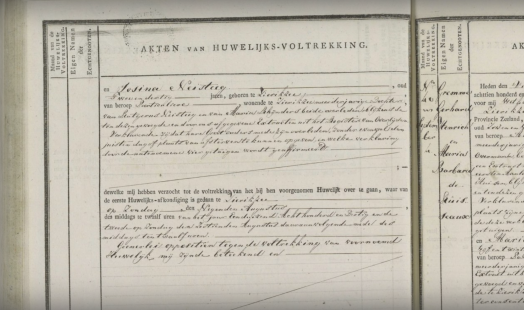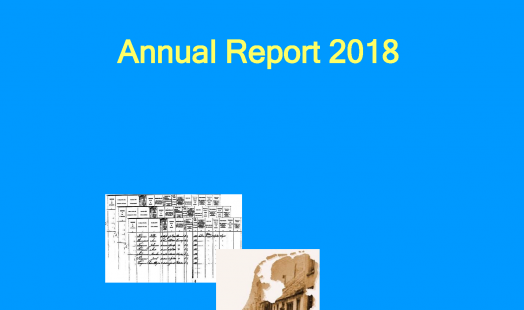Exploring Slave Trade in Asia
Exploring Slave Trade in Asia - Towards an Indian Ocean and Maritime Asia Slave Trade Database
Database
This project builds a database that reconstructs the historic slave trade in the Indian Ocean and Maritime Asia region in collaboration with an emerging network of scholars committed to develop a coherent field of Asian slave trade and slavery studies, including East, Southeast and South Asia as well as South and East Africa.
The project has established a relational database model that is able to accommodate structural differences in source material and (existing) datasets relating to different parts of the region.
Currently, the database contains almost 8,000 individual slave trade (sub)voyages across the maritime Asian region between roughly 1600 and 1850. According to our estimates, the number of enslaved persons transported during these voyages lies between at least 415,000 and 435,000 individuals.
In order to further develop the database, we have, and continue to, locate, collect, and curate existing research datasets relating to the historic slave trade in the Indian Ocean and maritime Asia region. The project also aims to curate new data, while looking for new (including non-European) sources for data extraction.
Context
Most of today’s 35.8 million people who live in conditions of slavery are located in Asia, especially India, Pakistan, China and Indonesia (GSI 2014). These conditions have deep historical roots. Scholarship has noted that slavery and slave trade were widespread throughout maritime Asia from the early modern period well into the nineteenth century (Reid 1983; Warren 1981 and 2010; Stanziani 2011 and 2017; Mann 2012). Recent estimates indicate that the Asian slave trade may have been almost as extensive as its Atlantic counterpart (Vink 2003; Allen 2010 and 2014; Van Rossum 2015; Bosma [2018-19]).
From a variety of angles scholars are now working towards a global perspective on the study of slavery and slave trade (Zeuske 2017). A pivotal part of this new turn in the history of slavery studies is the inclusion of maritime Asia. In contrast to the Atlantic space a comprehensive and detailed insight in the size, structure and patterns of this slave trade is lacking for this part of the world. Some topics and regions are relatively well-researched, such as the slave trade of the French near Madagascar and the Cape of Good Hope, but other regions are largely unexplored.
Three ways forward can be identified for the field of Asian slavery studies:
i) Stimulating interaction and connections: Slavery and related forms of bondage are studied for different regions, but usually not in comparative frame or with acknowledgement of their interconnectedness.
ii) Stimulating more research and archival work: Several important studies exist, but remain limited to rough estimates or specific imperial contexts. Recent studies successfully challenged this, but the available ground-data remains relatively limited (Allen 2010 and 2014).
iii) Mobilizing the wealth of available historical and quantifiable data on slave transportations, enslaved populations, markets and prices (Chatterjee and Eaton 2006; Mbeki and Van Rossum 2017).
Over the past three decades, scholars of Atlantic slave trade have taken an exemplary role in addressing such challenges and advancing their field substantially. The creation of Trans-Atlantic Slave Trade Database (http://www.slavevoyages.org) has been crucial in generating new reconstructions, highlighting connections and facilitating research and public awareness. This provides a fruitful model for initiatives to advance global perspectives and Asian slave trade and slavery scholarship.
Want to get involved?
Scholars or students who are interested in getting involved with the initiative through research and/or data are warmly invited to contact us. The project continues to collect and curate (new and existing) data and is open to new connections for the network.
Please do not hesitate to contact us to discuss forms of collaboration or the terms of a data deposit. For these and other questions or suggestions with regard to the project, data, or sources, please contact Merve Tosun (merve.tosun@iisg.nl) or Matthias van Rossum (mvr@iisg.nl).
Project Coordination
Prof. dr. Ulbe Bosma (International Institute of Social History)
Dr. Matthias van Rossum (International Institute of Social History)
Merve Tosun, MA (International Institute of Social History)
Network
Participants
Prof. dr. Richard Allen (Framingham University)
Prof. dr. Ulbe Bosma (International Institute of Social History)
Dr. Titas Chakraborty (Duke Kunshan University)
Dr. Claude Chevaleyre (École des Hautes Études en Sciences Sociales)
Prof. dr. Stephan Conermann (Bonn Center for Dependency and Slavery Studies)
Dr. Wil O. Dijk (Independent Researcher)
Dr. Daniel B. Domingues da Silva (Rice University)
Prof. em. dr. David Eltis (Emory University)
Dr. Jennifer L. Gaynor (School of Law, State University of New York at Buffalo)
Alexander Geelen, MA (International Institute of Social History)
Dr. Hubert Gerbeau (Maître de conférences émérite - Université Aix-Marseille III)
Dr. Jane M. Hooper (George Mason University)
Dr. Hans Hägerdal (Linnaeus University)
Dr. Preben Kaarsholm (Roskilde University)
Prof. dr. Gerrit Knaap (Huygens-ING)
Dr Pedro Machado (Indiana University)
Samantha Sint Nicolaas, MA (International Insitute of Social History)
Michael Reidy, MA (Independent Researcher)
Dr. Filipa Ribeiro da Silva (International Institute of Social History)
Dr. Matthias van Rossum (International Institute of Social History)
Dr. George Bryan Souza (University of Texas at San Antonio)
Dr. Rafaël Thiébaut (International Institute of Social History)
Merve Tosun, MA (International Institute of Social History)
Dr. Markus P. M. Vink (State University of New York at Fredonia)
Dr. Richard Zijdeman (International Institute of Social History)
Past events
Capture, Bondage, and Forced Relocation in Asia, International Conference, Institut d’Asie Orientale, ENS Lyon, 13 and 14 March 2019.
Towards an Indian Ocean and Maritime Asia Slave Trade Database, International Workshop, International Institute of Social History, Amsterdam, 27 and 28 September 2018.
Enslavement in the Indian Ocean World, International Workshop, Centre for Concurrences in Colonial and Postcolonial Studies, Linnaeus University, Växjö-Kalmar, Kalmar, 8 and 9 September 2017.
Slave Trade in the Indian Ocean and Indonesian Archipelago Worlds (16th to 19th Century): New Research, Results and Comparisons, International Workshop, International Institute of Social History, Amsterdam, 9 and 10 November 2016.
Data and Publications
Data
Slave trade data(sets) are sustainably stored in and accessible via the IISH Dataverse. We are working towards a public website for the database. To receive news on the latest developments, consider subscribing to our newsletter.
Previous newsletters
Newsletter VI
Newsletter V
Newsletter IV
Newsletter III
Newsletter II
Newsletter I
Essays and articles
S. Sint-Nicolaas et al., ‘Towards an Indian Ocean and Maritime Asia Slave Trade Database: An Exploration of Concepts, Lessons and Models’, Esclavages & Post-esclavages 3 (2020), 1-30, https://journals.openedition.org/slaveries/2946
Related publications
K. Ekama, L. Hellman, M. van Rossum, Slavery and Bondage in Asia, 1550-1850: Towards a Global History of Coerced Labour (De Gruyter 2022).
H. Hägerdal, ‘Introduction: Enslavement and the Slave Trade in Asia’, Slavery and Abolition 43:3 (2022), 445-459, https://doi.org/10.1080/0144039X.2021.2008723.
C. Chevaleyre, ‘Insiders by Analogy: Slaves in the Great Ming Code’, Slavery and Abolition 43:3 (2022), 460-481, https://doi.org/10.1080/0144039X.2021.2008721.
M. van Rossum, ‘Enslaveability, Slavery and Micro Histories: Reflections through the case of Cali’, Slavery and Abolition 43:3 (2022), 482-498, with contributions from Alexander Geelen and Merve Tosun, https://doi.org/10.1080/0144039X.2021.2008725.
G. Knaap, S’Slavery in the Dutch Colonial Empire in Southeast Asia: Seventeenth-Century Amboina Reconsidered’, Slavery and Abolition 43:3 (2022), 499-516, https://doi.org/10.1080/0144039X.2021.2008724.
S. E. Amirell, ‘”An Extremely Mild Form of Slavery… of the Worst Sort”: American Perceptions of Slavery in the Sulu Sultanate, 1899-1904’, Slavery and Abolition 43:3 (2022), 517-532, https://doi.org/10.1080/0144039X.2021.2008720.
R. B. Allen, ‘Exporting the Unfortunate: The European Slave Trade from India, 1500-1800’, Slavery and Abolition 43:3 (2022), 533-552, https://doi.org/10.1080/0144039X.2021.2008719.
H. Hägerdal, ‘Warfare, Bestowal, Purchase: Dutch Acquisition of Slaves in the World of Eastern Indonesia, 1650–1800’, Slavery and Abolition 43:3 (2022), 553-573, https://doi.org/10.1080/0144039X.2021.2008722.
M. van Rossum, ‘Towards a global perspective on early modern slave trade: prices of the enslaved in the Indian Ocean, Indonesian Archipelago and Atlantic worlds’, Journal of Global History 17:1 (2022) 42-68, https://doi.org/10.1017/S1740022821000139.
T. Chakraborty & M. van Rossum, ‘Slave Trade and Slavery in Asia – New Perspectives’, Journal of Social History 54:1 (2020), 1-14, https://doi.org/10.1093/jsh/shaa004.
H. Hägerdal, ‘Slaves and Slave Trade in the Timor Area: Between Indigenous Structures and External Impact’, Journal of Social History 54:1 (2020), 15-33,
https://doi.org/10.1093/jsh/shaa005.
R. Thiébaut, ‘French Slave Trade on Madagascar: A Quantitative Approach’, Journal of Social History 54:1 (2020), 34-65, https://doi.org/10.1093/jsh/shaa006.
A. Geelen et al., ‘On the Run: Runaway Slaves and Their Social Networks in Eighteenth-Century Cochin’, Journal of Social History 54:1 (2020), 66-87, https://doi.org/10.1093/jsh/shaa007.
K. Ekama, ‘Precarious Freedom: Manumission in Eighteenth-Century Colombo’, Journal of Social History 54:1 (2020), 88-108, https://doi.org/10.1093/jsh/shaa008.
U. Bosma, ‘Commodification and Slavery in the Nineteenth-Century Indonesian Archipelago’, Journal of Social History 54:1 (2020), 109-124, https://doi.org/10.1093/jsh/shaa009.
Funding
The first phase of this project was funded by the project grant Exploring Slave Trade in Asia (ESTA)awarded within the NWO Internationalisation in the Humanities Grant Programme (2018).







